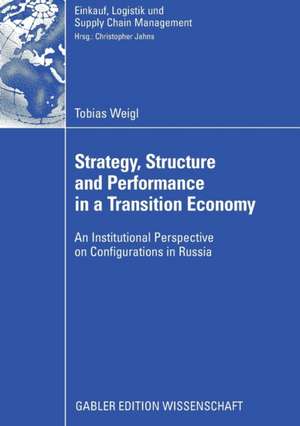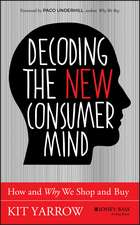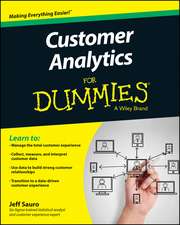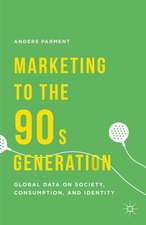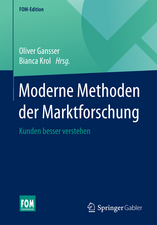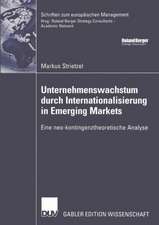Strategy, Structure and Performance in a Transition Economy: An Institutional Perspective on Configurations in Russia: Einkauf, Logistik und Supply Chain Management
Autor Tobias Weigl Cuvânt înainte de Prof. Dr. Christopher Jahns und Ass.-Prof. Dr. Evi Hartmannen Limba Engleză Paperback – 26 feb 2008
Din seria Einkauf, Logistik und Supply Chain Management
-
 Preț: 368.85 lei
Preț: 368.85 lei - 15%
 Preț: 441.83 lei
Preț: 441.83 lei - 15%
 Preț: 442.98 lei
Preț: 442.98 lei - 15%
 Preț: 442.48 lei
Preț: 442.48 lei - 15%
 Preț: 472.04 lei
Preț: 472.04 lei -
 Preț: 388.90 lei
Preț: 388.90 lei - 15%
 Preț: 438.40 lei
Preț: 438.40 lei -
 Preț: 384.31 lei
Preț: 384.31 lei -
 Preț: 377.73 lei
Preț: 377.73 lei -
 Preț: 384.31 lei
Preț: 384.31 lei - 15%
 Preț: 637.13 lei
Preț: 637.13 lei - 15%
 Preț: 638.43 lei
Preț: 638.43 lei -
 Preț: 384.48 lei
Preț: 384.48 lei - 15%
 Preț: 470.72 lei
Preț: 470.72 lei - 15%
 Preț: 439.89 lei
Preț: 439.89 lei - 15%
 Preț: 440.02 lei
Preț: 440.02 lei - 15%
 Preț: 469.74 lei
Preț: 469.74 lei -
 Preț: 382.18 lei
Preț: 382.18 lei
Preț: 392.97 lei
Nou
Puncte Express: 589
Preț estimativ în valută:
75.21€ • 78.31$ • 63.56£
75.21€ • 78.31$ • 63.56£
Carte tipărită la comandă
Livrare economică 08-22 martie
Preluare comenzi: 021 569.72.76
Specificații
ISBN-13: 9783835008748
ISBN-10: 3835008749
Pagini: 406
Ilustrații: XXII, 385 p.
Dimensiuni: 148 x 210 x 28 mm
Greutate: 0.53 kg
Ediția:2008
Editura: Gabler Verlag
Colecția Gabler Verlag
Seria Einkauf, Logistik und Supply Chain Management
Locul publicării:Wiesbaden, Germany
ISBN-10: 3835008749
Pagini: 406
Ilustrații: XXII, 385 p.
Dimensiuni: 148 x 210 x 28 mm
Greutate: 0.53 kg
Ediția:2008
Editura: Gabler Verlag
Colecția Gabler Verlag
Seria Einkauf, Logistik und Supply Chain Management
Locul publicării:Wiesbaden, Germany
Public țintă
ResearchCuprins
Basics on Strategy, Structure and Environment.- Russia as a Major Transition Economy.- Theoretical Framework and Hypotheses.- Empirical data.- Empirical analysis of the theoretical model.- Conclusion.
Notă biografică
Dr. Tobias Weigl promovierte bei Prof. Dr. Christopher Jahns am Supply Management Institute der European Business School (ebs) in Oestrich-Winkel. Er ist als Business Development Manager Emerging Markets bei DHL tätig.
Textul de pe ultima copertă
Being one of the biggest transition markets, Russia plays an increasing role within the global economy. Non-Russian firms are expanding into Russia in order to exploit the abundant growth opportunities. Simultaneously they face stronger competition in their home markets due to the entrance of global Russian players which try to explore opportunities abroad.
Based on the results of 177 survey responses, Tobias Weigl shows that the simple transfer of managerial and organizational skills, techniques, values and culture from developed countries to Russia is a false assumption among academics and practitioners. While executives from developed markets are driven by a rational economic model, which includes objective rules and arm’s length transaction structures, successful businesses in Russia need to incorporate the remaining influence of collectivism, paternalism and ‘blat’. Thus, successfully conducting business in Russia is based on network capitalism and relationships that co-exist within the pervasive environment of the Russian state.
Based on the results of 177 survey responses, Tobias Weigl shows that the simple transfer of managerial and organizational skills, techniques, values and culture from developed countries to Russia is a false assumption among academics and practitioners. While executives from developed markets are driven by a rational economic model, which includes objective rules and arm’s length transaction structures, successful businesses in Russia need to incorporate the remaining influence of collectivism, paternalism and ‘blat’. Thus, successfully conducting business in Russia is based on network capitalism and relationships that co-exist within the pervasive environment of the Russian state.
